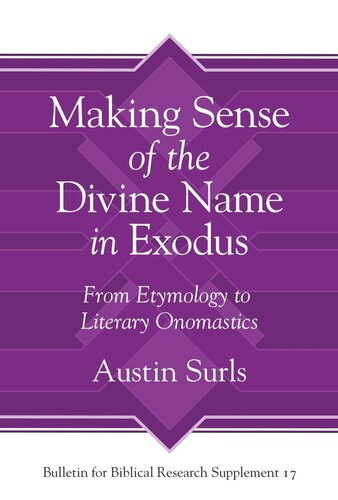

Most ebook files are in PDF format, so you can easily read them using various software such as Foxit Reader or directly on the Google Chrome browser.
Some ebook files are released by publishers in other formats such as .awz, .mobi, .epub, .fb2, etc. You may need to install specific software to read these formats on mobile/PC, such as Calibre.
Please read the tutorial at this link: https://ebookbell.com/faq
We offer FREE conversion to the popular formats you request; however, this may take some time. Therefore, right after payment, please email us, and we will try to provide the service as quickly as possible.
For some exceptional file formats or broken links (if any), please refrain from opening any disputes. Instead, email us first, and we will try to assist within a maximum of 6 hours.
EbookBell Team

4.0
36 reviewsThe obvious riddles and difficulties in Exod 3:13–15 and Exod 6:2–8 have attracted an overwhelming amount of attention and comment. These texts make important theological statements about the divine name YHWH and the contours of the divine character. From the enigmatic statements in Exod 3:13–15, most scholars reconstruct the original form of the name as “Yahweh,” which is thought to describe YHWH’s creative power or self-existence. Similarly, Exod 6:3 has become a classic proof-text for the Documentary Hypothesis and an indication of different aspects of God’s character as shown in history. Despite their seeming importance for “defining” the divine name, these texts are ancillary to and preparatory for the true revelation of the divine name in the book of Exodus.
This book attempts to move beyond atomistic readings of individual texts and etymological studies of the divine name toward a holistic reading of the book of Exodus. Surls centers his argument around in-depth analyses of Exod 3:13–15, 6:2–8 and Exod 33:12–23 and 34:5–8. Consequently, the definitive proclamation of YHWH’s character is not given at the burning bush but in response to Moses’ later intercession (Exod 33:12–23). YHWH proclaimed his name in a formulaic manner that Israel could appropriate (Exod 34:6–7), and the Hebrew Bible quotes or alludes to this text in many genres. This demonstrates the centrality of Exod 34:6–7 to Old Testament Theology. The character of God cannot be discerned from an etymological analysis of the word yhwh but from a close study of YHWH’s deliberate ascriptions made progressively in the book of Exodus.